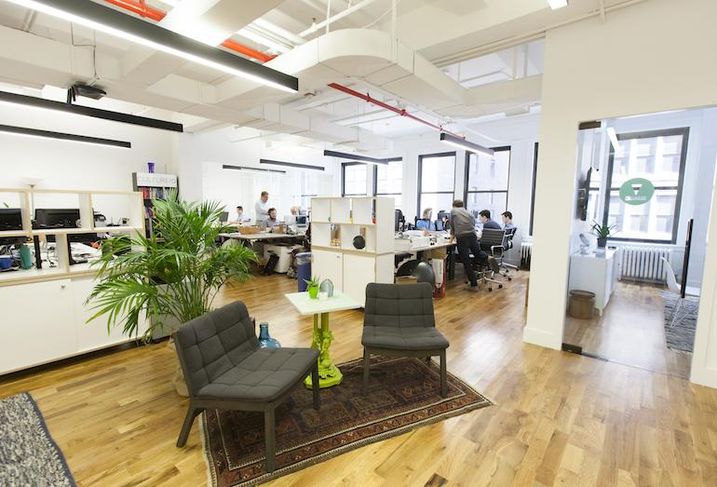When, Or If, Office Occupancy Rebounds Remains An Open Question
Bisnow, May 6, 2020
By Kelsey Neubauer
Office sector players agree there will be an increased demand for space flexibility in the future, but they are divided on how much lower occupancy rates in traditional offices will be when the current pandemic subsides, if at all.
Knotel CEO Amol Sarva predicted office occupancy will permanently hover around 60{486b2a1f74edcc5180758f2b50c14395cd5abf419f5fc0bc049abfed8e823f44} as more companies move toward a work-from-home policy during a Bisnow coworking and flexible office webinar Tuesday.
Transwestern New York co-founder and partner Lindsay Ornstein, Sarva’s co-panelist on the webinar, disagreed, saying that people will eventually feel safe enough to return to the office and work in communal spaces, and occupancy rates will bounce back.
“We’re going to see [lower occupancy rates] for sure in the short term, because we have to and health and safety necessitate that,” she said. “But in the long term … people want to be together. I can’t wait to give my colleagues and friends a hug. People want to sit next to each other in the pantry and have a coffee and a conversation. So as soon as there is treatment or vaccine for this disease and people have a sense of safety again, I don’t think we’re going to go to these draconian measures.”
Ornstein pointed to recent events that prompted the real estate sector to anticipate a dramatic and permanent change that did not occur.
“After every crisis, we’ve had these extreme reactions — after 9/11, nobody was going to be above the 10th floor, and after Hurricane Sandy no one was going to be on the lower levels,” she said. “Time goes by, and people tend to forget … We will have open floor plans and we will have workstations. I don’t think the super condensed model is going to last, but I don’t think that was going to last anyway because people just didn’t like it.”
While Sarva acknowledged that many of the fears in the aftermath of those disasters abated, he pointed to long-lasting changes to everyday life that didn’t.
“You know you still take your shoes off in the airport now, 20 years later, because of one guy,” he said. “Not every reaction to 2001 became permanent, but some of them did.”
While the broker and the flex office provider CEO disagreed on several points, they agreed that there will be long-term demand for coworking and flex office space — even if the model requires some design changes — after the pandemic.
“If you’re coming up on a lease expiration, and you’re not sure of the economy or your business, coworking is a great solution,” Ornstein said. “So there are a lot of roles for coworking now and in the future. So I don’t see coworking going anywhere, as long as coworking can weather through right now, they should be solid in the long run.”
PwC Advisory Real Estate Director Katherine Huh said her clients are discussing what kind of design changes will be needed to get back in the office space.
“I think the offices that they go to need to be prepared to keep those in their safe. You know, gone are the days of 45 SF offices, basically,” she said. “You need a certain amount of space to feel safe, and the coworking providers are going to probably make certain adjustments in order to accommodate that.”
PwC is also looking into a new combination of workspace solutions: some traditional office space, some flex office space and having some employees continue to work from home, Huh said. But she added there will definitely be an increased demand for flex space.
“I think where some landlords, and rightfully so, were not interested in being flexible in arrangements or didn’t have the ability to be flexible in arrangements,” Huh said. “That’s kind of hard for some companies to stomach, and I think the more flexible, the better. I think flexible working spaces are looking pretty good to a lot of companies right now.”
Leaders in the office sector have been contemplating how social distancing will affect demand for their spaces since the shutdown began.
In another webinar last month, Marty Burger argued that while there may be a shift toward decreased density of workers in office spaces, the amount of space needed to socially distance will make up for the gap, leaving office demand exactly where it was before the pandemic.
A recent survey released by CoreNet showed that 69{486b2a1f74edcc5180758f2b50c14395cd5abf419f5fc0bc049abfed8e823f44} of corporate real estate companies would decrease their office space footprint.
There has been much speculation about the future of coworking and flex space within this conversation. Operators predict that the industry will bounce back in the long-term, but not before many coworking businesses shutter or are scooped up by bigger firms. Small operators, which make up 80{486b2a1f74edcc5180758f2b50c14395cd5abf419f5fc0bc049abfed8e823f44} of the market share nationwide, would be especially vulnerable.
Since March, Knotel has made mass layoffs, plans to give 20{486b2a1f74edcc5180758f2b50c14395cd5abf419f5fc0bc049abfed8e823f44} of its space back to landlords and reportedly missed rent payments. Coworking giant WeWork also allegedly missed rent payments. Sarva said on the webinar that discussions with landlords over space have moved slowly, but he also pointed out that many locations Knotel leases in global markets have reopened.
Coronavirus Saps Enthusiasm for Spec Warehouse Development
Commercial Property Executive, May 27, 2020
The effect is already filtering to the industrial sector, said Matthew Dolly, director of research for real estate brokerage Transwestern…
Where Are CRE Capital Dollars Flowing In The Wake Of The Pandemic?
Bisnow, May 6, 2020
“What we are seeing from investors right now is a barbell approach,” Transwestern Executive Managing Partner Steve Pumper said while speaking at Bisnow’s “Where is the Money Flowing?” webinar…
Ports of Los Angeles and Long Beach Might End Up as Losers Post-Pandemic
National Real Estate Investor, May 28, 2020
The ports of Los Angeles and Long Beach were the first to feel the impact of a slowdown in international trade, with volumes dropping more than 30 percent in March, says Miami-based Walter Byrd, executive managing director for industrial services with Transwestern…
Sinking Feeling: Elevators Could Thwart Office Re-Entry
Bisnow, May 26,2020
“For those markets that have been open, we’re seeing some really great responses from the tenants with our communication and social distancing strategies,” Transwestern Managing Director of Asset Services Katie Sakach said…
























